In a flurry of ribbon-cutting, project launches and seminar speeches, ministers are set to make a last-minute dash to tick off their to-do lists before April, with elections just around the corner.
Higher Education, Science and Innovation Minister Blade Nzimande ticked off a big item on 23 January when he announced details of a comprehensive student funding model with R3.8-billion for loans for the “missing middle” students, too rich for state subsidies but too poor to pay fees.
His performance agreement for June 2019 to April 2024, signed on 23 October 2020, stipulates he must “ensure policies for funding the missing middle are put in place alongside [an] effective monitoring system”.
On Thursday, 25 January, Transport Minister Sindisiwe Chikunga’s department hosted an industrial colloquium on a freight road-to-rail migration plan. The private-sector participation framework was meant to be in place by 2020, and the shift of 10% of road freight to rail by 2024.
Finalising and implementing this road-to-rail strategy was the transport minister’s responsibility. The missed target may be argued away using factors such as the Covid-19 lockdowns, amid insistence something like the colloquium is being done now.
But it’s unclear whether Chikunga’s performance indicators are the same as her predecessor Fikile Mbalula’s. Although he traded the transport portfolio for the ANC secretary-general’s office at Luthuli House more than a year ago, it is his signed performance agreement that’s online.
This signals government slapdashness.
Missing online are the performance agreements of several ministers appointed in President Cyril Ramaphosa’s August 2021 and March 2023 Cabinet reshuffles, like Performance and Evaluation Minister Maropene Ramokgopa, Electricity Minister Kgosientsho Ramokgopa and Cooperative Governance Minister Thembi Nkadimeng.
Defence Minister Thandi Modise’s agreement has been added. Several ministers who were moved still have their old ones online, like Women, Youth and Persons with Disabilities Minister Nkosazana Dlamini Zuma, whose performance agreement is still for Cooperative Governance.
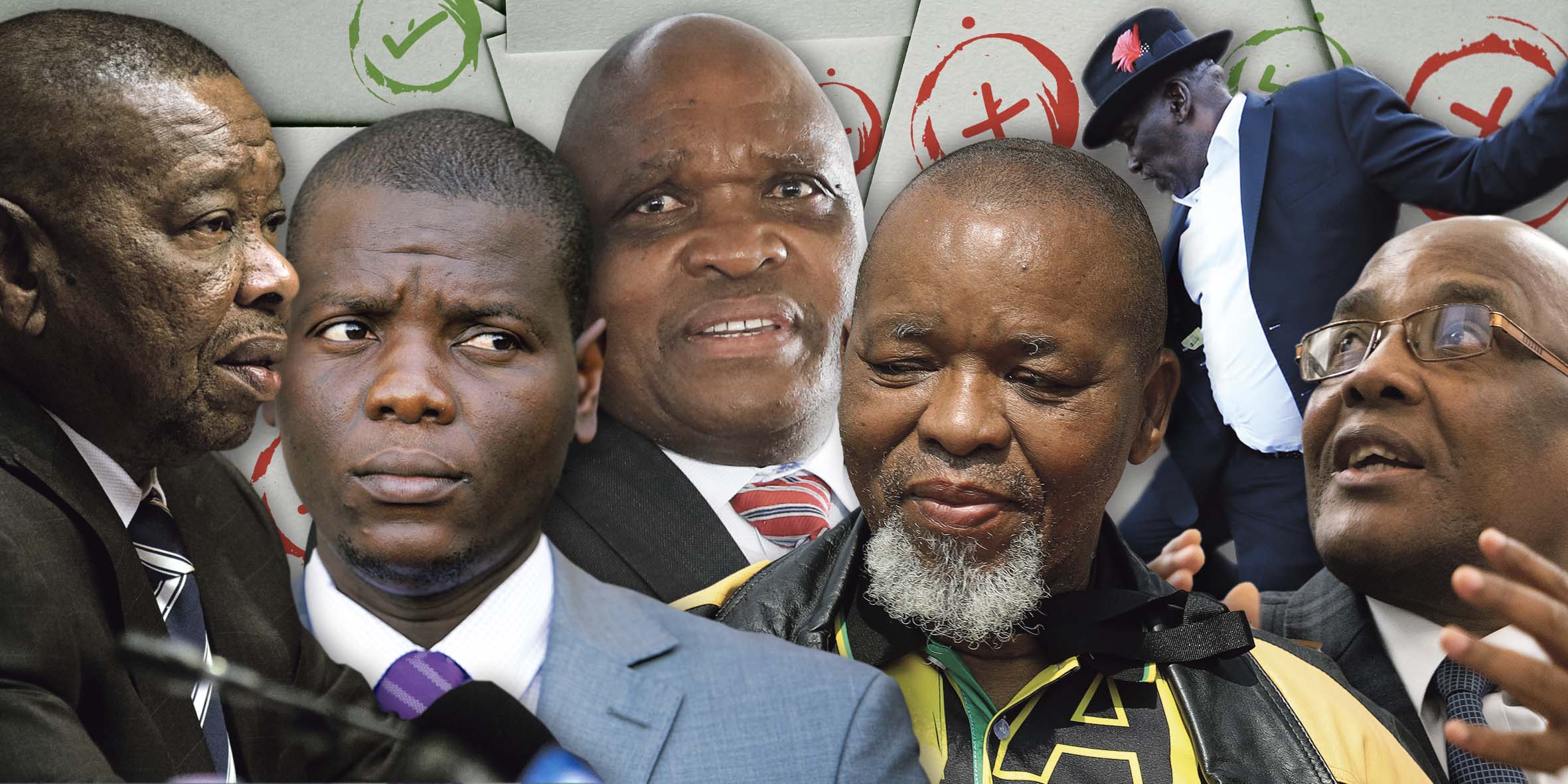 Illustrative image: From left: Higher Education, Science and Innovation Minister Blade Nzimande. (Photo: Waldo Swiegers / Bloomberg) | Justice and Correctional Services Minister Ronald Lamola. (Photo: Leila Dougan) | Health Minister Joe Phaahla. (Photo: Luba Lesolle / Gallo Images) | Mineral Resources and Energy Minister Gwede Mantashe. (Photo: Papi Morake / Gallo Images) | Police Minister Bheki Cele. (Photo: Shelley Christians) | Home Affairs Minister Aaron Motsoaledi. (Photo: Leila Dougan)
Illustrative image: From left: Higher Education, Science and Innovation Minister Blade Nzimande. (Photo: Waldo Swiegers / Bloomberg) | Justice and Correctional Services Minister Ronald Lamola. (Photo: Leila Dougan) | Health Minister Joe Phaahla. (Photo: Luba Lesolle / Gallo Images) | Mineral Resources and Energy Minister Gwede Mantashe. (Photo: Papi Morake / Gallo Images) | Police Minister Bheki Cele. (Photo: Shelley Christians) | Home Affairs Minister Aaron Motsoaledi. (Photo: Leila Dougan)
Mixed bag
An analysis of 10 performance agreements representative of the economic, social services and security clusters reflects a decidedly mixed bag.
And although chats with the President happen for suboptimal performance, only underperformers might face action.
It may be a step too far to deduce that the performance reviews between April and July 2023, revealed in a parliamentary reply, arose over shoddy performance. But the performance monitoring and review section in the eight-page annexure on explanatory guidelines in each agreement states:
“In the instance where performance is sub-optimal, a meeting between the president and minister will be convened. The outcome of the dialogue will be an agreement between the president and minister on areas of improvement (the remedial actions)...
“It is only in the case of underperformance that the president may take any action he deems necessary.”
In some performance agreements, but not all, it was “persistent underperformance”; in the one that Public Enterprises Minister Pravin Gordhan signed, “persistent” was scratched out.
Fuzzy language, few defined achievements
Underperformance, persistent or not, is not defined. With just a few exceptions, ministers just “coordinate”, “monitor” and “support”. It’s the kind of fuzzy language that could mean anything and everything.
The performance agreements are based on the 2019-2024 Medium-Term Strategic Framework from which senior officials must develop so-called delivery plans.
With different language and phrasing used across different performance agreements, senior officials’ involvement in drafting their minister’s performance indicators is not implausible.
In Police Minister Bheki Cele’s agreement signed on 23 October 2020, his responsibilities read like entries from the SA Police Service (SAPS) annual report – “ensure the identified illegal mining operations are responded to in relation to requests received”, “ensure the identified organised crime groups or syndicates are neutralised with arrests”, “ensure identified clandestine laboratories are dismantled with arrests”.
Reducing crime is a given for a police minister – but not exactly that Cele had to “ensure the conviction rate for serious fraud and corruption in the private and public sector is reduced”. Perhaps it’s just badly phrased, but it’s in an official document.
In a country where trust in police stands at 43.35%, according to an SAPS-commissioned independent report (the target was a 50% trust level), perhaps Cele’s performance agreement should have been less focused on operational indicators, and more on policing reform and efficiency.
For example, the National Development Plan recommends demilitarising ranks and establishing an independent police board for all SAPS appointments to eradicate patronage and factionalism.
It didn’t happen.
The independent survey the SAPS commissioned showed not only low public trust, but also that just 31.6% of SAPS members agreed that police did not abuse their power.
Load shedding and three ministers
Gordhan, the minister responsible for Eskom, has a performance agreement signed on 16 October 2020 that stipulates an energy availability factor (EAF) of more than 80% – an impossibility and so a fail.
Currently, the EAF stands at 54.8%, and Eskom aims to boost it to 70% by the end of the 2024/25 financial year.
This EAF was required so the minister could “stabilise governance and sort out operational and maintenance inefficiencies”. The indicator helps to explain the fixation with delaying the decommissioning of South Africa’s ageing coal power plants.
But Gordhan got a break – Ramokgopa has run with EAF, generation and now also transmission lines, which need an additional 6,000km built by 2030 at an estimated cost of R360-billion.
Four years late, only in January this year, did Eskom announce the board for the National Transmission Company of South Africa, which will be the system operator for the first five years once the Electricity Regulation Amendment Bill becomes law.
Responsibility for this legislation is neither Ramokgopa’s nor Gordhan’s, but falls to Mineral Resources and Energy Minister Gwede Mantashe, who must “provide legislative and regulatory framework for a restructured electricity supply industry”, according to his performance agreement signed on 30 October 2020.
The 80% EAF also pops up in Mantashe’s agreement, linked to “creating the maintenance space for Eskom by augmenting the supply with 2,000MW of emergency energy and independent power producers (IPPs)”. The earmarked 1,221MW of emergency power controversially awarded to Karpowership remains enmeshed in environmental appeals.
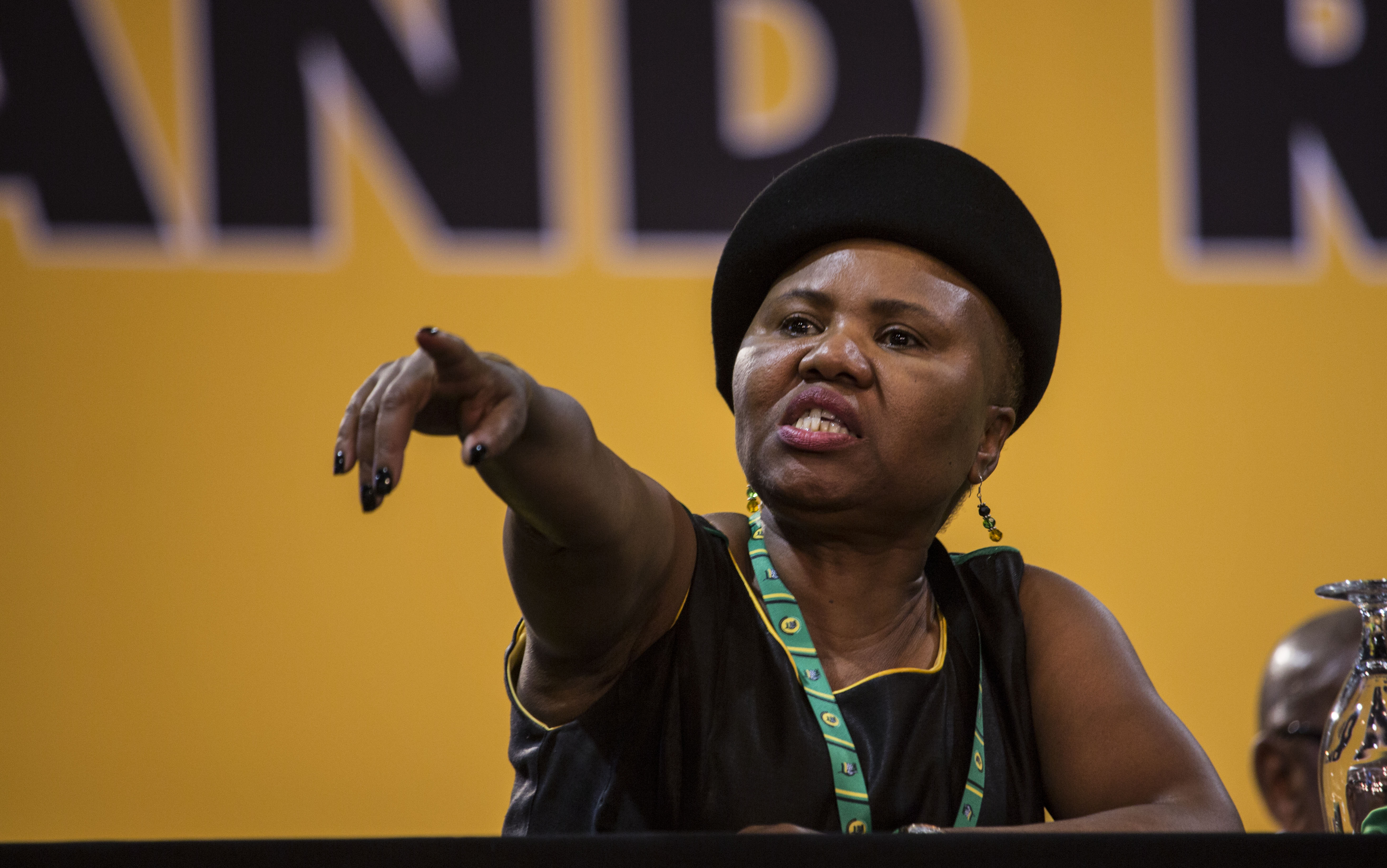 Social Development Minister Lindiwe Zulu at the ANC's National Elective Conference, Nasrec, 18 December 2017. (Photo: Leila Dougan)
Social Development Minister Lindiwe Zulu at the ANC's National Elective Conference, Nasrec, 18 December 2017. (Photo: Leila Dougan)
Ministerial cooperation pitfalls
A new transmission operator may be needed, but, aside from asking nicely, Gordhan can’t tell Mantashe what, when or how to do anything, while Ramokgopa claims the PR limelight, talking the talk of progress in difficult times.
This illustrates the need for cooperation across government – and its pitfalls.
Despite years and years of talk about how government should not work in silos, individual departmental dynamics, vested interests and more, including what’s been privately described as endless meetings, work against coordination.
The persistent rotational power cuts are costing South Africa tens of billions of rands in economic growth, as is the continuing freight logistics chaos at the ports and railways that Transnet is responsible for.
Gordhan’s headache extends to his performance indicator to “stabilise and ensure SOEs return to profitability to support economic growth”. But the devil is in the detail.
Stabilisation could be argued to have been achieved as Eskom got R254-billion, including government taking over some of its debt, in 2023, and the private-sector partner in the Durban port may be counted as stabilising Transnet. A performance tick is the corporatisation of Transnet’s National Ports Authority.
Gordhan relies on other Cabinet colleagues’ collaboration. That snag also hit Social Development Minister Lindiwe Zulu, who is responsible for the social grants – from pensions to childcare support – paid to about 19 million South Africans.
But she relies on others like Communications Minister Mondli Gungubele, whose alleged political meddling in Postbank led to its board’s resignation during the September grant payment system outage.
Zulu’s performance agreement includes biometrics for grant beneficiaries and South African Social Security Agency staff, alongside eradicating open space payment points. That’s in the making as numbers of cash payout points are reduced from more than 9,600 to 894, despite civil society concern about the impact.
It’s unclear what happened on the indicator of linking 10% of households living on grants to sustainable livelihoods by 2024, given the minister’s responsibility to “support the development of this strategy”.
In a fail, Social Development has lost its early childhood development responsibility; it emerged that only a third of qualifying children were enrolled in these early childhood centres.
Although civil society organisations are critical of the R17 a day for each qualifying child, all early childhood development is now with Basic Education.
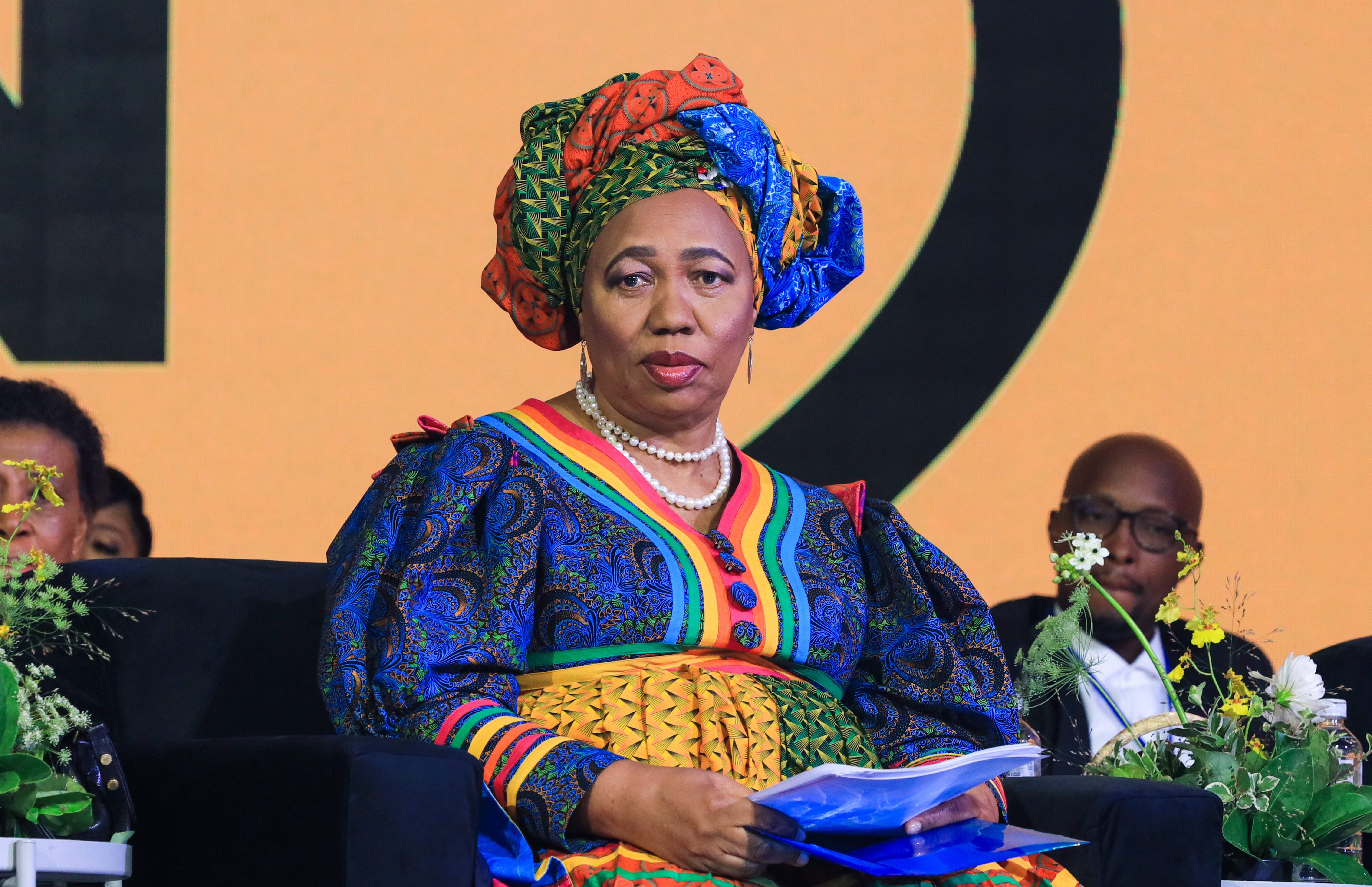 Basic Education Minister Angie Motshekga at the release of the 2023 matric exam results at Mosaïek Church in Fairland, Randburg, on 18 January 2024 in Johannesburg, South Africa. (Photo: Gallo Images / Luba Lesolle)
Basic Education Minister Angie Motshekga at the release of the 2023 matric exam results at Mosaïek Church in Fairland, Randburg, on 18 January 2024 in Johannesburg, South Africa. (Photo: Gallo Images / Luba Lesolle)
Education hits and misses
Basic Education Minister Angie Motshekga must be chuffed as the matric Class of 2023 produced 282,894 Bachelor’s passes, well above the 190,000 target by 2024 set in the performance agreement she signed on 30 October 2020.
However, that is marred by 81% of Grade 4 learners being unable to read for meaning, according to the 2021 Progress in International Reading Literacy Study (Pirls).
The target was a 355 Pirls score; South Africa got 288. But Motshekga’s performance agreement only requires her to “monitor” it.
School infrastructure is a performance fail for the minister, who must “monitor and take remedial action” so minimum physical infrastructure standards are met. The 2023 Medium-Term Budget Policy Statement cut the school infrastructure grant because money was not being spent. Despite long-standing pledges, and the Sanitation Appropriate for Education programme, launched by Ramaphosa in August 2018, pit latrines are still not eradicated.
In tertiary education, Nzimande’s record seems wobbly on ensuring “effective oversight and improved management of NSFAS [the National Student Financial Aid Scheme]”. The state’s student funder has long been in the public eye for inefficiencies, corruption and dysfunction such as delayed or wrong payments to students.
In September 2023, Parliament’s public spending watchdog, Scopa, was told that the NSFAS 2022/23 annual report was only expected in Parliament in May 2024, eight months past the statutory deadline.
Though NSFAS board chairperson Ernest Khosa has taken a leave of absence pending the investigation into kickbacks highlighted by the Organisation Undoing Tax Abuse, Nzimande denied wrongdoing and welcomed the probe.
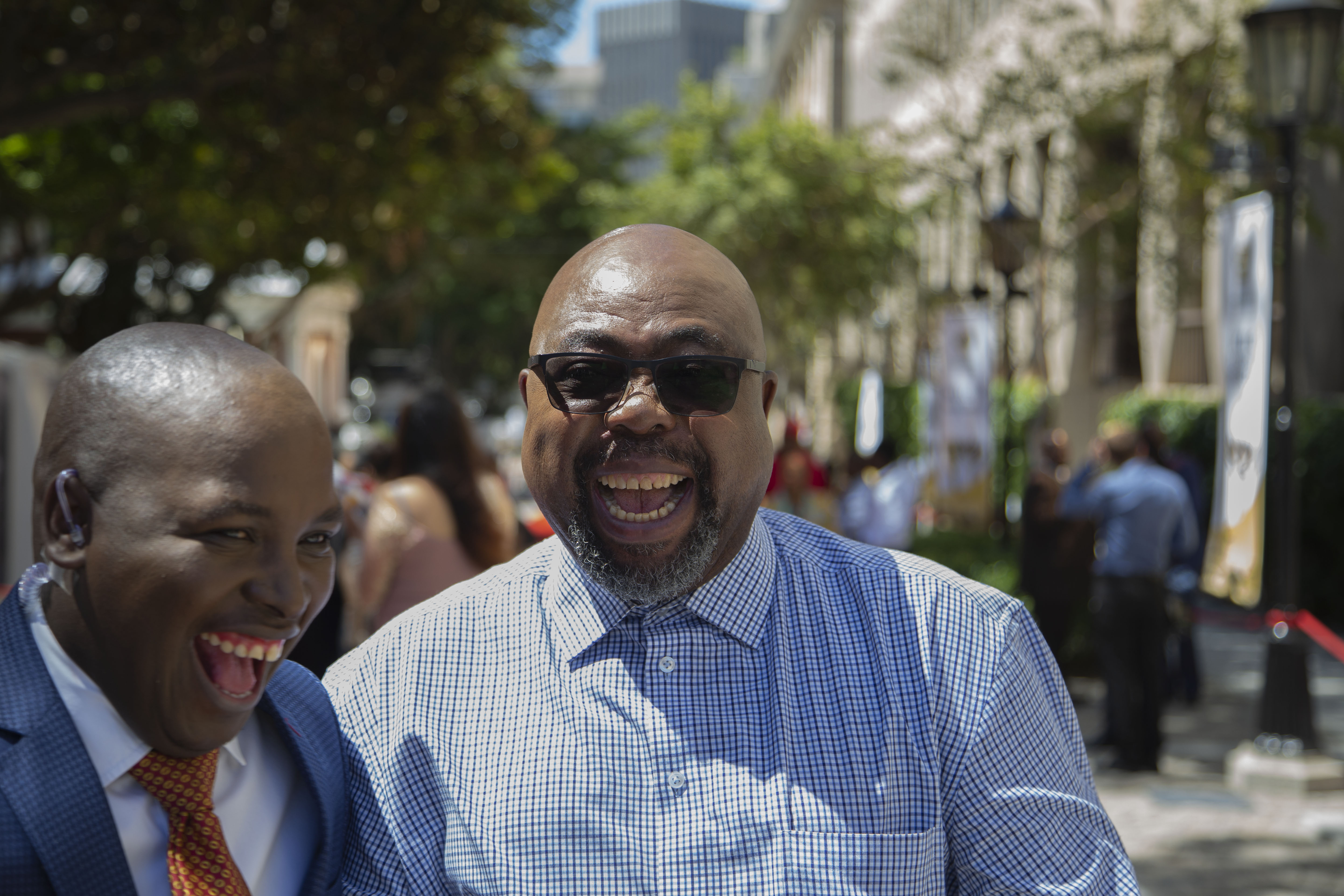 Employment and Labour Minister Thulas Nxesi on the red carpet before the State of the Nation Address, 13 February 2020. (Photo: Leila Dougan)
Employment and Labour Minister Thulas Nxesi on the red carpet before the State of the Nation Address, 13 February 2020. (Photo: Leila Dougan)
Corruption controversies
Nzimande isn’t the only Cabinet minister in a pickle. Employment and Labour Minister Thulas Nxesi is in court to set aside the R5-billion Unemployment Insurance Fund (UIF) jobs deal that he insists was signed off without his knowledge. He has denied accepting bribes.
This follows abuse of the Covid-19 Temporary Employer/Employee Relief Scheme. Although “facilitating mobilisation of resources” to protect workers and vulnerable businesses during the pandemic was a performance indicator, ensuring good governance wasn’t.
With unemployment at 41.2% on the expanded definition that includes those too disheartened to even try to look for work, job creation should be central to any economic growth focus. Though Nxesi must “facilitate and coordinate programmes with the Presidency” to deliver on the 2018 Jobs Summit pledges and 256,050 jobs under the Presidential Employment Stimulus, his performance agreement is light on the jobs front.
But he gets a tick for tabling the Employment Equity amendment legislation that allows the minister to set numerical sectoral targets to ensure equitable representation. Parliament passed it on 17 May 2022.
Although the minister “must ensure targets are met” on turnaround times for unemployment and other benefits in his performance agreement signed on 6 October 2022, overseeing improvements in governance of the troubled Compensation Fund is absent from the agreement.
Performance indicator oddities
It’s an oddity that Nzimande has to ensure “increased enrolment in diplomas in agriculture”; so is Justice Minister Ronald Lamola’s contribution to fighting organised crime – “ensure the conviction rate for cable theft increases”.
Curiously, against the Master’s Office online services for deceased estates, liquidations, trusts and more, the justice minister’s performance agreement is blank. But Lamola has in fact taken action on the troubled Master’s Office – in November 2023 he announced a rescue plan to deal with backlogs, corruption and dysfunction.
For his agreement signed on 16 October 2022, Lamola got two ticks for bringing the Criminal Procedure Amendment Bill and Hate Speech and Hate Crimes Bill to Parliament, which has passed both.
Establishing specialised commercial crimes courts in Limpopo, Mpumalanga, North West, the Eastern Cape and the Free State gets a tick, with the Northern Cape an extra.
Policy, law-making and regulations
That policymaking for good governance – not individual laws – is not part of the ministerial performance indicators is astounding. That’s even more so as the Ramaphosa administration pushes a raft of structural reforms for economic growth, ranging from road-to-rail freight shifts to energy reform and visa regimen overhaul.
On the legislative front, ministers falter. Getting draft Bills through the Cabinet process to the departmental public comment period, and ultimately to Parliament, can take 12 to 18 months. Only at this point can MPs start the law-making process, but they are put under pressure so the Cabinet can tick off its annual legislative programme.
It’s a dynamic that has crept in as South Africa’s constitutional democracy increasingly focuses not on Parliament, the people’s assembly, but on the presidency and ministers.
Home Affairs visa and other debacles
Home Affairs Minister Aaron Motsoaledi took just over three years to get the Border Management Authority going after its law was signed into effect in July 2020. So it’s a tick in the shortish performance agreement signed by the minister on 16 October 2020.
Not so for providing the “political leadership” to ensure an uninterrupted, fully functioning Automated Biometric Information System in the 2022/23 financial year. March 2024 is the new target date, MPs were told in September 2023.
On the visa and permit front, the minister must ensure implementation of e-visas at 106 missions abroad by 2025, and had to implement them at 10 by 2020/21.
The system may be there, but not all’s well – of the 6,329 rejected e-visa applications, more than half, or 3,687, were denied because of “the date of travel for the application having already passed”, according to a 2023 parliamentary reply.
The target of 85% of scarce skills visa applications being adjudicated in four weeks appears to have been missed amid backlogs and lengthy approval processes.
As of 31 August 2023, the backlog for visas and permits of all types was 74,309 and 43,944 respectively, according to a parliamentary reply, which added: “The department envisages to have cleared the backlog by November 2024.” A performance fail, then.
National Health Insurance
Much of Health Minister Joe Phaahla’s unsigned but lengthy 38-page performance agreement is linked to National Health Insurance (NHI).
Indicators range from providing the political leadership to get the legislation passed, which happened in December 2023, to submitting integrated progress reports on the 25% of health facilities that must be certified each year from 2024 through “the presidential war room on NHI”.
Given the continued contestation and criticism of this version of NHI by business, doctors’ organisations and others, the comms strategy is a fail.
The NHI, however, has not yet been signed into law by Ramaphosa. Wearing his hat as ANC boss, he told the party faithful at the recent January 8 Statement celebrations that the NHI would be implemented “whether they like it or not”.
The leadership he’s required to provide for an updated 10-year infrastructure plan hasn’t yet produced anything concrete.
Also not quite ticked as done is the prickly issue of medico-legal claims. These drain the health coffers and are flagged as a concern by the Auditor-General. Phaahla’s performance agreement requires him to get his department to submit reports to the National Health Council, and then “provide political oversight for the reduction of medico-legal claims”.
Ministerial strategic leadership
All performance agreements include ministers’ “strategic leadership” and “political oversight” of their directors-general and departments. The terms are not defined, and difficult to nail down, but they are outlined in the explanatory guidelines.
As well as providing oversight to eliminate wasteful, irregular and fruitless expenditure, ministers are required to participate actively in interministerial committees and the so-called MinMECs, which bring together ministers and the relevant nine provincial MECs.
Also included is “100% accountability to Parliament”. That sounds impressive, but requires the bare minimum – timely answering of parliamentary questions and complying with the statutorily required tabling of budgets, plans and reports.
Even then, it goes awry. Scores of questions are answered late or lapse, although in 2023, with concerted effort by Parliament, eventually all but one question was ultimately answered.
In 2023, again, not all annual reports were tabled in time, a sign of financial and governance issues. Eskom’s 2022/23 annual report was late, as were the reports of SAA, Denel, diamond miner Alexkor, the UIF and the Compensation Fund. As well as the NSFAS report, also outstanding in early January is the annual report of the Onderstepoort Biological Products SOE.
Maybe action on underperformance
No minister has yet been sacked for nonperformance – never mind long social grant queues, a stubborn unemployment rate that hits the youth hardest, paralysed hospitals where key equipment doesn’t work or murder rates akin to countries in civil wars.
Ministers seem to get several second chances. To recap the performance conditions, “it is only in the case of underperformance that the president may take any action he deems necessary”.
Ministerial performance agreements are not new, but making them public is.
In September 2014, as deputy president, Ramaphosa told MPs that the agreements were “about the relationship between the president and his Cabinet”.
In the 2020 State of the Nation Address, as president, he announced the performance agreements would be made public as “...the cornerstone of a new culture of transparency and accountability, where those who are given the responsibility to serve – whether as elected office bearers or public servants – do what is expected of them...”
The vibe is right, the execution not so much – from the agreements’ fuzzy language to missing public accountability as scorecards remain undisclosed. No minister has yet been sacked or asked to resign.
Publishing the ministerial performance agreements was a nod to transparency, but without accountability. DM
This story first appeared in our weekly Daily Maverick 168 newspaper, which is available countrywide for R29.





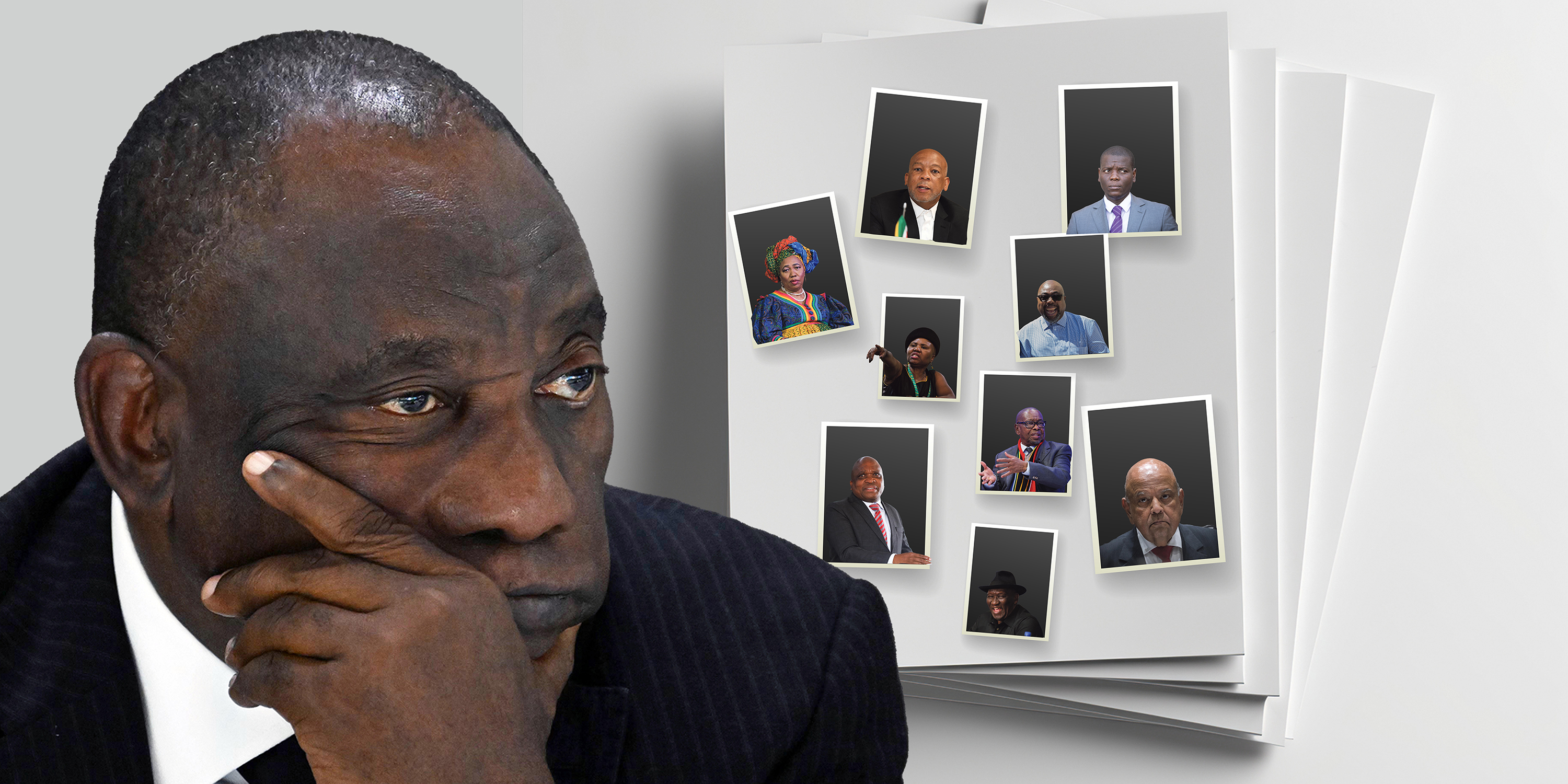 Labour and employment minister Thulas Nxesi on the red carpet prior to the State of the Nation Address, 13 February 2020. he annual presidential address comes in the midst of a harsh economic environment, service delivery failures, incapacitated SOEs, rampant crime and high unemployment. (Photo: Daily Maverick/Leila Dougan)
Labour and employment minister Thulas Nxesi on the red carpet prior to the State of the Nation Address, 13 February 2020. he annual presidential address comes in the midst of a harsh economic environment, service delivery failures, incapacitated SOEs, rampant crime and high unemployment. (Photo: Daily Maverick/Leila Dougan) 